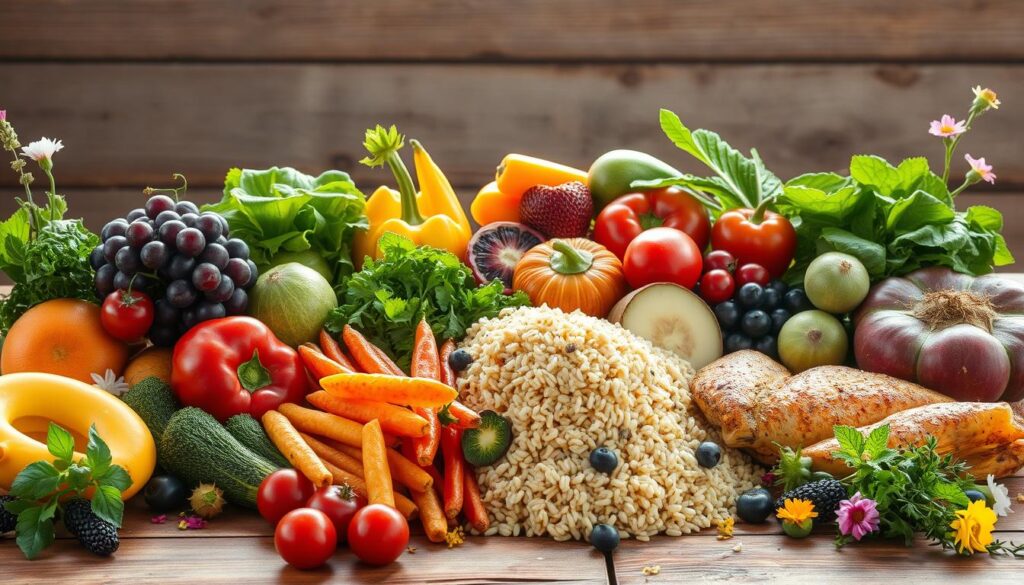Starting a healthy diet is key to a better life. It boosts your physical and mental health. This guide offers tips to help you enjoy food without diet culture stress.
Eating a variety of foods can stop meal boredom. It also helps keep your blood sugar balanced. This balance is crucial for your energy and mood.
About 37% of people think they’re hungry when they’re really thirsty. Drinking enough water is important for healthy eating.
Choosing whole foods like avocados and olive oil keeps you full. They also help control your hormones and energy. Adding seasonal fruits and veggies boosts your immune system. Every healthy choice you make helps your overall wellness.
Key Takeaways
- Diversifying your diet helps prevent food burnout.
- Maintaining balanced blood sugar levels enhances overall health.
- Proper hydration is vital for distinguishing between hunger and thirst.
- Healthy fats and whole foods contribute to better energy and mood.
- Incorporating seasonal produce increases your antioxidant intake.
The Importance of a Healthy Diet
Eating well is key to staying healthy. A good diet does more than help you lose weight. It also boosts your physical and mental health. Knowing how food affects us helps us choose better for our health and life span.
Understanding Nutrition and Its Impact on Health
Eating a balanced diet is vital for avoiding diseases like heart disease, diabetes, and some cancers. The Centers for Disease Control and Prevention say heart disease is the top killer in the U.S. for adults. But, eating right can cut down this risk a lot.
Studies show that changing our diet can prevent up to 80% of early heart disease and stroke cases. This shows how crucial healthy eating is.
How a Healthy Diet Affects Physical and Mental Well-Being
What we eat affects our mood. Eating too much sugar can make us feel down, while foods like fruits and lean proteins can lift our spirits. Foods full of antioxidants can also lower cancer risk.
Also, eating right helps keep our weight in check. This is good for managing diabetes and keeping cholesterol levels in balance.
| Health Aspect | Impact of Healthy Diet |
|---|---|
| Heart Health | Reduces risk of heart disease and stroke by managing blood pressure and cholesterol levels. |
| Mental Well-Being | Supports better mood stability and cognitive function, decreasing symptoms of anxiety and depression. |
| Weight Management | Helps maintain a healthy weight, reducing the risk of type 2 diabetes and obesity. |
| Immunity | Strengthens the immune system with essential nutrients, reducing the risk of illness. |
Foundations of a Healthy Diet

Creating a balanced diet means knowing the essential nutrients for health. Focusing on these nutrients is key. Eating whole foods instead of processed ones is crucial for getting more nutrients.
Essential Nutrients for Optimal Health
A healthy diet includes important nutrients like:
- Proteins: Important for muscle repair and growth. Get them from lean meats, fish, dairy, and plants.
- Fats: Healthy fats from olive oil, nuts, and avocados are good for the heart. But limit saturated and trans fats.
- Carbohydrates: Whole grains and fiber-rich foods give energy and help digestion. Refined grains lack nutrients.
- Vitamins and Minerals: Fruits and veggies are full of vitamins. Minerals like calcium and iron are key for bones and energy.
These nutrients help the body work right and prevent diseases like heart disease, diabetes, and obesity. Eating less salt and sugar and more fruits and veggies is good for health.
The Role of Whole Foods in Your Diet
Whole foods are vital for health because they’re full of nutrients and not processed. Eating a variety of:
- Fruits and Vegetables: Aim for five servings a day to lower disease risks.
- Whole Grains: Foods like brown rice, quinoa, and whole wheat give fiber and energy.
- Lean Proteins: Fish, beans, and poultry are good for nutrients without bad fats.
- Healthy Fats: Unsaturated oils and nuts are good for the heart in small amounts.
Choosing whole foods over processed ones helps get the nutrients needed. This improves health. Healthy eating habits prevent many diseases and keep you well.
| Nutrient | Food Sources | Health Benefits |
|---|---|---|
| Proteins | Lean meats, fish, dairy, legumes | Muscle repair, immune function |
| Carbohydrates | Whole grains, fruits, vegetables | Energy, digestive health |
| Healthy Fats | Olive oil, nuts, fatty fish | Heart health, cholesterol management |
| Vitamins | Fruits, vegetables, dairy | Boosting immunity, metabolic processes |
| Minerals | Dairy, leafy greens, lean meats | Bone health, energy production |
Building Healthy Eating Habits

Creating healthy eating habits is key to lasting wellness. Mindful eating helps you enjoy your meals more. It makes you pay attention to the taste and texture of your food.
This way, you learn to listen to your body. It helps you make better food choices. This builds a positive relationship with food.
Mindful Eating Practices
Mindful eating means eating with full attention. It’s about enjoying your food without distractions. This way, you can tell when you’re full.
It’s not just about eating right. It’s also about enjoying your meals. Slowing down and savoring each bite makes eating more fulfilling.
Listening to Your Body’s Hunger Cues
Knowing when you’re hungry is important. It helps you make better food choices. It’s about listening to your body, not just eating out of habit.
By checking your hunger before eating, you make smarter choices. It’s about listening to your body’s needs, not just cravings.
Portion Control Techniques
Controlling your portions is vital for good health. Eating too much can lead to extra calories. It’s important to use portion control techniques.
Try using smaller plates and measuring your food. Being aware of packaging sizes helps too. Knowing the right serving sizes keeps your meals balanced and healthy.
Maintaining a Balanced Diet

Wellness starts with a balanced diet. It’s about eating a variety of foods to get all the nutrients your body needs. Using seasonal ingredients makes meals tasty and nutritious. Learning about balanced meals helps keep you healthy.
Diversifying Your Food Choices
Eating a variety of foods is key to good nutrition. It ensures you get a wide range of nutrients. Aim for 5 servings of fruits and veggies a day to lower disease risk.
Adding whole grains, lean proteins, and healthy fats from different sources makes your diet richer.
Incorporating Seasonal Ingredients
Seasonal ingredients add flavor and nutrients to your meals. They are fresh and full of goodness. Choosing seasonal foods also supports local farmers and cuts down on food transport’s environmental impact.
For example, enjoy leafy greens in spring and root veggies in winter. It keeps your meals exciting and nutritious.
The Significance of Balanced Meals
Balanced meals are crucial for your health. They include veggies, proteins, whole grains, and healthy fats. This mix gives you energy and supports your overall health.
Starchy foods should be a small part of your diet. Include fish, especially oily ones, for omega-3s. Watch your fat and sugar intake too. Fat should not be more than 30% of your calories, and saturated fats less than 10%.
| Food Type | Recommended Intake | Key Nutritional Benefits |
|---|---|---|
| Fruits and Vegetables | At least 5 portions daily | Lower heart disease, stroke risk, improve overall health |
| Starchy Foods | Just over a third of meals | Energy source, aids digestion |
| Fish | At least 2 portions weekly (1 oily) | Omega-3 fatty acids, promotes heart health |
| Saturated Fat | Less than 10% of total energy intake | May help prevent heart-related diseases |
| Sodium (Salt) | Less than 5g daily | Acts to prevent hypertension and heart disease |
Healthy Diet and Disease Prevention

Eating well is key to staying healthy. A good diet can help you live longer and avoid serious health problems. It’s especially good for fighting heart disease, type 2 diabetes, and obesity.
How Nutrition Affects Chronic Disease Risk
Poor eating habits are linked to many deaths in the U.S. In 2012, about 45% of deaths from heart disease, stroke, and type 2 diabetes were due to bad diet. This shows how important diet is for staying healthy.
The Link Between Diet and Immune Function
A healthy diet boosts your immune system. It helps fight off infections and keeps you well. Foods rich in antioxidants, vitamins, and minerals are especially good for your immune system.
| Food Group | Recommended Intake | Examples |
|---|---|---|
| Fruits | 2 cups per day | Apples, bananas, berries |
| Vegetables | 2.5 cups per day | Spinach, carrots, broccoli |
| Whole Grains | 6-8 ounces per day | Brown rice, quinoa, whole wheat bread |
| Protein Foods | 5-6.5 ounces per day | Lean meats, poultry, fish, legumes |
| Dairy | 3 cups per day | Fat-free milk, yogurt, cheese |
By eating right, you not only get better nutrition but also a stronger immune system. This helps a lot in preventing diseases.
Practical Tips for Embracing a Healthy Diet
Healthy eating doesn’t have to be hard. With some simple meal planning and smart shopping tips, you can eat well and enjoy it. These strategies help you make nutritious meals and snacks. They fuel your body and keep cravings away.
Meal Planning and Preparation Strategies
Good meal planning is key to healthy eating. Spend some time each week planning meals to avoid unhealthy choices. Here are some tips:
- Plan meals around seasonal fruits and vegetables for freshness and flavor.
- Create a versatile menu that lets you swap ingredients based on what’s available.
- Make snacks ahead of time to have healthy options easily.
Smart Grocery Shopping Tips
Grocery shopping can be tricky with all the unhealthy options. A few strategies can make it healthier:
- Always shop with a list to stay focused and avoid impulse buys.
- Choose whole foods like fruits, vegetables, and whole grains.
- Explore different aisles for unique ingredients to add nutritional diversity.
Healthy Snacking Options
Snacking is important for keeping energy up all day. Choosing healthy snacks supports your wellness. Here are some ideas:
- Fresh fruits like apples, bananas, and berries are sweet and nutritious.
- Vegetables with hummus or yogurt dip are crunchy and low in calories.
- Nuts and seeds are packed with nutrients, but eat them in moderation.
Misconceptions About Healthy Diets
Understanding healthy diets often means clearing up common misconceptions. These myths can lead to unhealthy eating habits. By debunking these myths, we can find better ways to eat.
Debunking Popular Diet Myths
Many diet myths are not supported by science. For example, not all fats are bad. Healthy fats in foods like avocados and nuts are good for us. Another myth is that we need to detox our bodies with special diets. Our bodies can remove toxins on their own.
It’s important to know the truth about nutrition. This helps us make better choices.
The Risks of Restrictive Diets
Restrictive diets can harm our relationship with food. They can make us feel guilty or anxious. Some people might even binge eat in response.
Studies show that 90-95% of diets fail. This often leads to weight gain after the diet ends. Instead, focusing on balanced eating is healthier in the long run.
Emotional and Mental Wellness Through Nutrition
Many studies show that what we eat greatly affects our mood. A diet full of omega-3s, fruits, veggies, and whole grains helps our brain and emotions. For example, a Mediterranean diet greatly reduced depression in young men, showing diet’s big impact on mental health.
The Connection Between Diet and Mood
It’s important to understand how food affects our mind. Eating regularly stops blood sugar drops that can make us irritable. Drinking enough water also boosts mood and focus.
Healthy fats like olive oil and nuts improve brain function. Fruits and veggies give us vitamins and minerals for our mental health. Many adults are now changing their diets for better mental health, showing the value of healthy eating.
Understanding the Importance of Self-Care
Self-care is not just about physical health; it’s also about how we eat. Healthy eating habits build emotional strength and improve mental health. Regular meals and sharing food with others strengthen social bonds and comfort.
But, it’s crucial to avoid extreme diets or unhealthy eating habits, which can harm our mental health. A balanced diet, exercise, and enough sleep are essential for true health and emotional stability.
FAQ
What is the importance of a healthy diet?
A healthy diet gives the body what it needs. It lowers the risk of chronic diseases. It also boosts physical and mental health.
What are some essential nutrients needed for optimal health?
Essential nutrients include proteins, fats, carbs, vitamins, and minerals. Each one has a special role. For example, proteins help muscles repair, and vitamins support the immune system.
How can I build healthy eating habits?
To build healthy eating habits, start with mindful eating. Listen to your body’s hunger signals. Also, use portion control to eat right.
What role do whole foods play in a healthy diet?
Whole foods are rich in nutrients and are minimally processed. They provide vitamins and minerals that are key for health and wellness.
How does nutrition affect chronic disease risk?
A healthy diet, full of antioxidants and nutrients, can reduce chronic disease risk. It supports immune function and overall health.
What are some practical tips for meal planning?
For meal planning, plan meals ahead. Make a shopping list for whole foods. Also, prepare healthy snacks like fruits and veggies.
What are some common misconceptions about diets?
Some common diet myths include thinking all fats are bad or that detox diets are needed. These myths can lead to unhealthy eating and anxiety.
How does diet influence emotional wellness?
A diet rich in nutrients can stabilize mood and improve brain function. This shows how important nutrition is for emotional and mental health.
Why is diversifying food choices important?
Diversifying food choices ensures a wide range of nutrients. It makes meals interesting and supports a balanced diet for long-term health.
What are healthy snacking options?
Healthy snacks include nuts, yogurt, and fresh fruits and veggies. They help keep energy levels up throughout the day.



